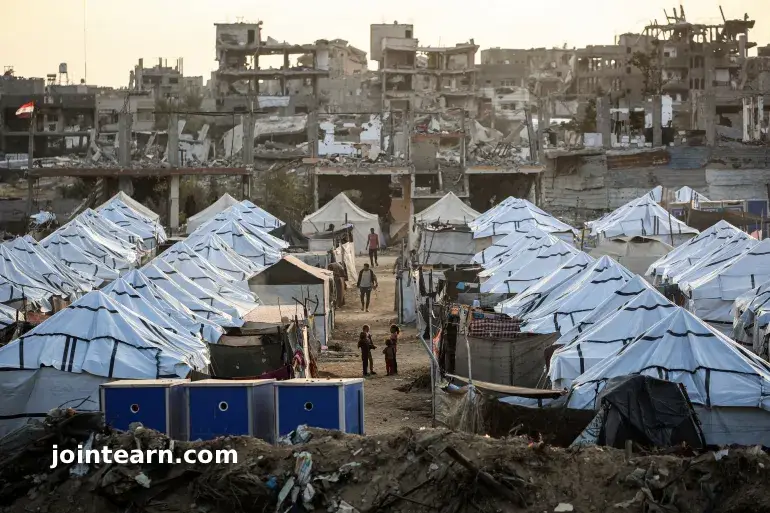
UNRWA Condemns Israel for Restricting Aid During Ongoing Crisis
The humanitarian situation in Gaza continues to deteriorate as aid supplies remain drastically insufficient to meet the needs of millions of Palestinians. The United Nations Relief and Works Agency (UNRWA) has sharply criticized Israel for obstructing aid deliveries, undermining relief operations, and impeding the survival of civilians in the region.
Despite a ceasefire agreement that mandates the passage of humanitarian aid into Gaza, only a fraction of the required aid has entered the territory, leaving many families exposed to harsh winter conditions with minimal shelter or relief.
UNRWA Calls for Immediate Action
UNRWA Commissioner-General Philippe Lazzarini addressed the UN General Assembly’s Fourth Committee, emphasizing the legal and humanitarian imperative to safeguard the agency’s operations. “Protecting UNRWA’s mandate is essential under international law, crucial to the survival of millions of Palestinians, and pivotal for any political resolution,” Lazzarini said. He cited findings from the UN Commission of Inquiry and rulings by the International Court of Justice, which call on Israel to lift restrictions affecting the agency.
At a New York press conference, Lazzarini highlighted severe funding shortfalls threatening UNRWA’s services, urging donor nations to step up support. “We operate week by week, month by month. As of today, we can process salaries for November, but we have no visibility for December,” he stated, underlining the urgency of sustained funding.
Restrictions and Accusations
Israel has prohibited UNRWA operations on its soil, citing unproven allegations that some agency employees were involved in the October 7, 2023, Hamas-led attacks on southern Israel. Following these claims, the United States, historically UNRWA’s largest donor, suspended its funding, further exacerbating the agency’s operational challenges.
The restrictions forced UNRWA to repatriate much of its international staff from Gaza and the West Bank, limiting its capacity to distribute food and essential aid. Despite these obstacles, the agency continues to employ approximately 12,000 Palestinians, providing vital services including food aid, healthcare, and education.
“About 75,000 people are currently sheltered across 100 UNRWA premises in Gaza,” Lazzarini reported. “Over the past two years, we have provided more than 15 million primary health consultations, with an average of 14,000 consultations daily. Our vaccination campaigns, conducted jointly with UNICEF and WHO, continue to save lives.”
Without additional funding, Lazzarini warned, “the delivery of critical services to millions of Palestinian refugees will be severely compromised.”
Humanitarian Crisis Worsens Amid Ceasefire Violations
The ceasefire, which took effect on October 10, 2025, stipulated an increase in humanitarian aid deliveries, with plans for at least 600 trucks per day entering Gaza. However, only approximately 150 trucks are entering daily, leaving over two million displaced Palestinians with insufficient shelter, food, and medical support.
Al Jazeera correspondent Hind Khoudary reported from central Gaza that many families in makeshift camps have received no aid at all, leaving them vulnerable to the harsh winter rains. The lack of adequate humanitarian support has led UN agencies to warn that Gaza’s hunger crisis remains catastrophic, particularly in the north, where famine was officially declared in August.
Trucks carrying aid have recently resumed passage through the northern Zikim border crossing after a two-month closure, providing some relief to the affected population. Palestinian truck driver Abdulkarim Abu Daqqa confirmed that around 80 trucks were loaded and ready to deliver supplies, though consistent access remains a concern.
Prisoner Exchanges and the Human Cost
The October ceasefire also outlined provisions for the exchange of captives and deceased individuals between Israel and Hamas. Israel has received one of the last four captives’ bodies, Meny Godard, who died in the October 2023 attacks. Hamas continues to work on recovering the remaining three bodies, located in challenging and dangerous areas of Gaza.
Meanwhile, Israel has released nearly 2,000 Palestinian prisoners and returned the bodies of hundreds of deceased Palestinians. Gaza health officials have reported that many returned bodies show signs of torture, execution, and mutilation, adding to the region’s ongoing humanitarian and psychological trauma.
The Path Forward
UNRWA continues to expand its services in Gaza despite funding cuts and operational restrictions. However, the agency warns that without a significant influx of resources and the removal of impediments to aid delivery, millions of Palestinian refugees will face an increasingly dire winter, compounded by malnutrition, inadequate shelter, and lack of medical care.
As winter approaches, the urgent need for international attention and assistance grows. The international community faces mounting pressure to ensure humanitarian aid reaches all those affected in Gaza, safeguarding lives and supporting the prospects for long-term peace and stability in the region.


Leave a Reply